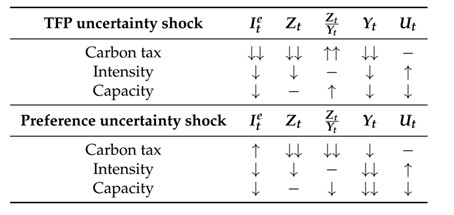
ABSTRACT
The existing literature on carbon policy analysis in a random environment focuses on the existence of the level (first-moment) shocks, whereas recent research emphasized the nonnegligible impact of uncertainty (second-moment) shocks on macroeconomy. This paper studies the impact of uncertainty (second-moment) shocks on the carbon emissions, abatement investment, and output. We construct an environmental dynamic stochastic general equilibrium (E-DSGE) model that features uncertainty shocks from the good demand and supply. By comparing the social welfare among carbon taxation, intensity, and capacity regimes, we show that the carbon taxation is the best policy regarding positive uncertainty shocks of households preference (good demand), whereas capacity and intensity targets are preferable under the uncertainty shocks of firms productivity (good supply).
KEYWORDS
Environmental policy; uncertainty shock; E-DSGE model
JCR CLASSIFICATION
Q2
Sustainability
https://doi.org/10.3390/su11184993
